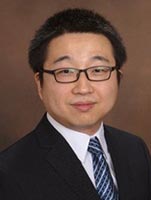Date
Cost
Free and open to the public
Location
Research Pavilion, Room 475 (NanoScience Technology Center)
Description
New technologies for developing smart electronics and optoelectronics with tunable/adaptive functionalities are critical to emerging applications in wearable technology, advanced manufacturing, renewable energy, personal healthcare and environmental monitoring, which demand the active and adaptive interactions between devices and stimuli. Non-electrical stimuli are ubiquitous and abundant in the environment, such as mechanical agitation from human body. It is however not facile to directly interface them, using the state-of-the-art silicon technology, in which the fundamental components performing intelligent-bearing operations are prevalently the field-effect-transistors (FETs). Piezoelectric effect has been widely used in sensing, actuation and energy harvesting. Conventional piezoelectric materials such as PZT and PVDF are insulating and therefore not feasible for constructing functional electronics or optoelectronics. The fundamental effect of piezoelectric polarization on charge carrier processes by dynamic perturbation, which has immediate relevance to the abovementioned emerging applications, has been long overlooked. Motived by these, my research has focused on exploring the emerging piezotronic effect, which is the modulation of charge carrier process by dynamic-strain-induced polarization, for nanoscale renewable energy and novel smart electronics/optoelectronics by rational design, manufacturing and integration of nanostructured piezoelectric semiconductors, e.g. 1D ZnO nanowires and 2D single-atomic-layer MoS2. I will discuss the fundamental of piezotronics and the updated progress of related applications. These novel nanomaterials and device concepts enable the new integration scheme for developing self-powered smart nanosystems, via addressing both fundamental and technological issues essential for the development of scalable and manufacturable nanotechnologies. I will close with a vision of my future research.
Bio:
Dr. Wenzhuo Wu is currently the postdoctoral fellow in School of Materials Science and Engineering at Georgia Institute of Technology. He received his B.S. in Electronic Information Science and Technology in 2005 from the University of Science and Technology of China (USTC), Hefei and his M. Eng. in Electrical and Computer Engineering from the National University of Singapore (NUS) in 2008. After working at Chartered Semiconductor Manufacturing (now Global Foundries) in Singapore from 2007 to 2008, he began the doctoral research under the supervision of Prof. Zhong Lin Wang and received his Ph.D. from Georgia Institute of Technology in Materials Science and Engineering in 2013. Dr. Wu's research interests include synthesis, manufacturing and integration of nanomaterials for functional devices and systems in enabling novel nano-electronics/optoelectronics and self-powered nanosystems.
Presenter

Wenzhuo Wu, Ph.D.
School of Materials Science and Engineering
Georgia Institute of Technology
Contact
Rebeca Barrios NanoScience Technology Center 407-882-1515 NSTCsearch@ucf.edu